Simplifying Compost — FAQ for Home Gardener
One of the biggest mistakes I see home gardeners make regarding composting is this: we overcomplicate it. It’s easy to do, though, because there’s so much research out there and it can seem overwhelming.
Our gardens thrive with compost, and truly, it’s one of the easiest, most inexpensive activities you can do for your garden. But still, if you’re like most beginning gardeners, you probably have questions. We dive deep into the composting world on my latest podcast on The Beginner’s Garden. You can listen to that below, or keep reading.
Before we dive in and answer some of the questions that I’ve been asked about the composting process in a home garden, I think it’s important for you to know that I’m what people would call a “lazy composter.” My garden is large, my family is busy, and I just don’t have time to focus on the minute details that serious composters do. In my world, I know that eventually, everything will break down. So, keep that in mind as we go.
The Basics
What are the Ingredients for Healthy Compost?
First, you need browns. These will be your carbon sources like paper, cardboard, pine shavings, etc. Next, you need a nitrogen source, known as your greens. These are your kitchen scraps, weeds that haven’t gone to flower yet, or livestock manure. You also need air (which you get as you turn your pile) and water.
We will talk more in detail about good aeration further down, but you want to make sure you keep your compost pile damp as well. And while a good 3x3x3 pile is ideal, you don’t have to have that much volume to make it work.
For more details on the ingredients that go into a good compost pile, read this post about composting basics.

How long does it take from Start to Finished Product?
Most of this is dependent on temperature. In the winter, the microbes, which break down your raw materials into compost, are not very active. The breakdown process will be very slow going through these months, and it will accelerate quickly as the weather warms.
It also depends on how specific you are with your browns and greens ratios. If you are dialing in a specific formula, the compost can be achieved much quicker. If you’re a lazy composter like me, it can take a little longer. I will say the compost I put in my tumbler becomes ready much faster than my open-air piles.
How do you Know the Compost is Ready To Add To The Garden?
First of all, I think we all have this idea in our heads that the compost we add to our garden will be this light, fluffy, even consistent substance. In my experience (as a lazy composter), this rarely happens. Different things compost happens at different rates.
This also depends on the size of the inputs going in. If I don’t chop any stalks or sticks that go into the pile, they won’t break down at the rate that my kitchen scraps do. But if everything goes into the pile a uniform size, you will probably get a more uniform compost.
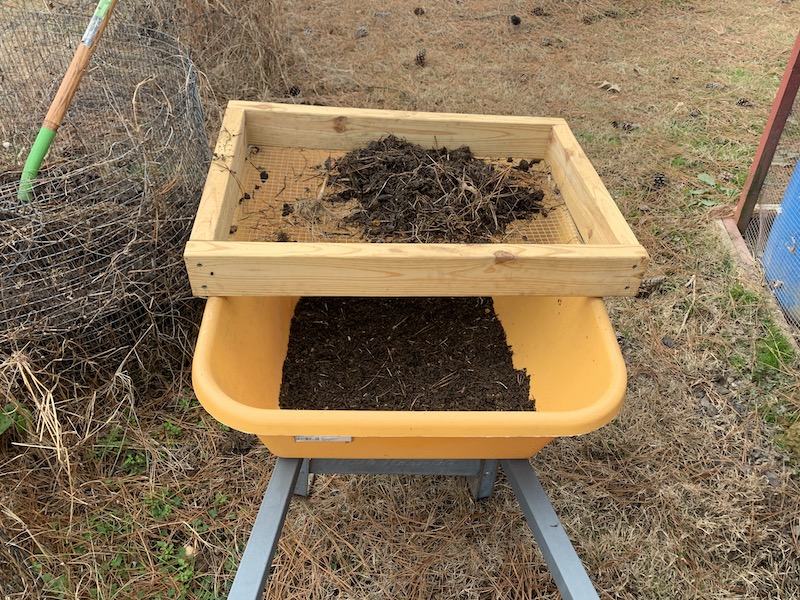
I don’t worry too much about this, if all I can see are some of those larger inputs and the rest has broken down. If you’re covering your garden with compost in the fall, know it will also continue to break down a little more. A great rule of thumb for me is if I can’t see the banana peel, it’s good to go!
Does the Compost Pile Have to be in a Shaded Area?
During the summer, the compost pile can become very dry. If it gets too dry, the breakdown will slow down or stop, and essentially, your composting will take longer. If your pile is in the shade, the moisture won’t evaporate as fast. If it’s in the sun (like mine is), you’ll either need to add water to the pile or know that the compost may take longer to break down into a usable form.
Do You Need a Compost Starter or Activator?
You will find compost “starters” on sale to get your compost a boost of nitrogen or beneficial microbes, but in most cases, I really don’t think it’s necessary. I always add a handful of my previous batch of compost or just leave some soil that sticks to the roots of my weeds when I add them to the pile. The microbes will make their way to the pile and nature will start doing her thing.
Perhaps these starters will help speed the process along; it never hurts to try if that’s important to you. I’ve just never chosen to go this route.
Is All Compost Equal and Suitable For Adding To Anything?
In my opinion, yes. I’ve added compost to every part of my garden and all crops and can’t think of a reason why you shouldn’t. This, of course, assumes that your compost hasn’t been tainted with persistent herbicides that might come from nonorganic hay, tainted horse/cow manure, or grass clippings from a lawn that has been treated.
Is it Necessary to Turn the Compost and How do you it?
Air is a key component of the composting process, so turning your pile or roughing it up will help it break down. There are several ways to do that. With my compost bin, I turn it with a pitchfork. Ideally, you want to turn it weekly. I’ve gone months without turning mine, but I have lots of sticks that keep air flowing in mine.
If you have a composting tumbler, the process of turning the drum keeps your compost aerated. Ideally, I’ll try to turn it weekly, especially if I have compact and matted sources in my tumbler.
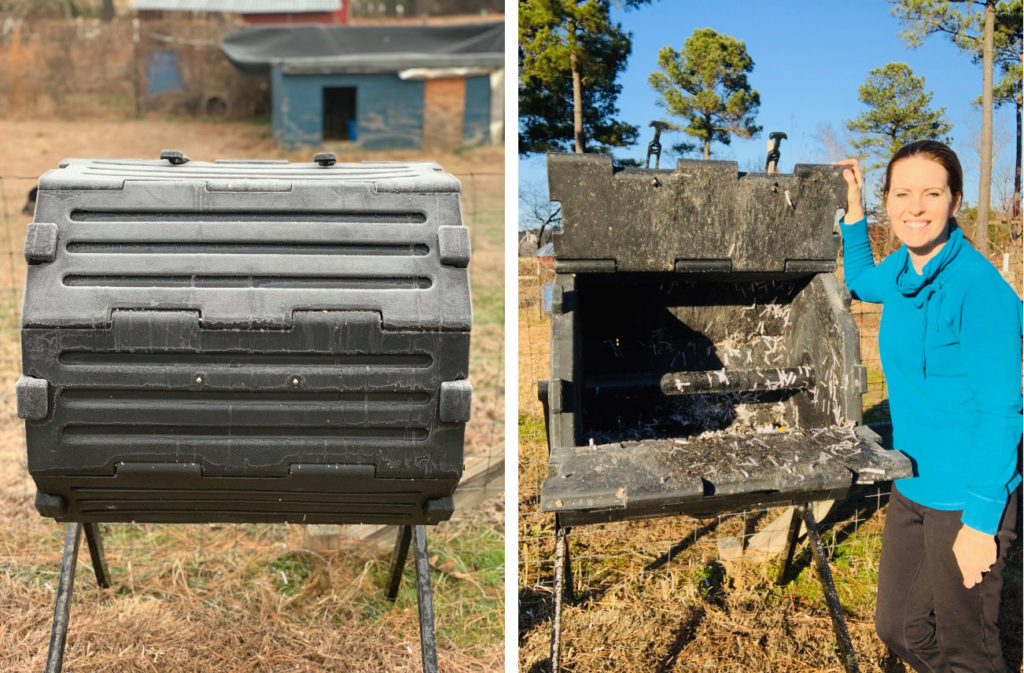
How Do You Keep it Wet In Dry Seasons?
A lot of people will water open compost piles with their water hoses. It shouldn’t shock you to know by now that I just let mine sit. I’m a lazy composter! I may not have mine ready as quickly as people who really focus on it, but I know eventually it, it all breaks down.
It really does need to be wet, though, for the quickest result. I add a lot of kitchen scraps to my compost pile, which adds moisture through those inputs. To prevent evaporation in the dry season, you can also cover the pile with a tarp.
Do You Need To Cover It In Rain?
I never have, but people can and do. My compost pile is open-air and also open to the ground, meaning earthworms can get in and help with that whole process. But this can also be bad because heavy rains can get in and leach out the nutrients of the compost pile.
Ideally, it would be best to cover my compost piles during heavy rain seasons and it’s something I would recommend if you have and open air and open ground compost pile.
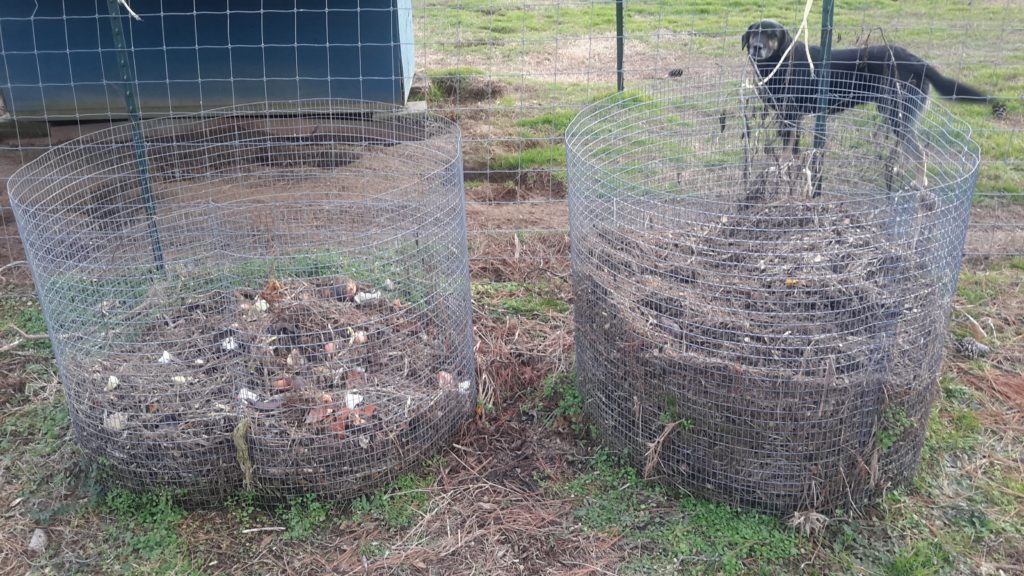
What Do You Use To Grind Up Thick Yard Waste
Examples of this would be your corn stalks, your big okra stalks, etc. Obviously, the finer material, the better in your compost pile, as they break down quicker. I have used loppers to break down my stalks into smaller pieces. I’ve also used a hoe to break them down in the the smaller pieces.
Both of these methods give you quite a workout, so be prepared. I’ve also just thrown them in the compost pile and they have taken many months to break down. The bigger the inputs of the compost pile are, the longer the process will take. You could buy a chipper shredder, but that’s a financial investment.
Winter Composting
How Does It Work Through The Winter?
In my zone 7b, we rarely get below 10 degrees Fahrenheit. My compost piles slow down and it does create compost in the spring from what I added in the fall. If you live in a colder climate, you may find that your pile stops composting during the coldest of the winter season. Don’t worry, it will pick back up with the warmer weather.
Do You Keep Adding Material In The Winter and Does It Compost Slower?
Yes and Yes. I add to my pile all winter long. It does compost slower, because as we said earlier, the higher the temperature, the faster it will compost, but the purpose of having a compost pile is to throw your scraps onto it all year long.
If you have much colder winters than I do, the freezing and thawing help break down the cell walls of the inputs and the compost will break down more rapidly when the weather does warm up.
Do I Need to Cover It In The Winter?
I personally don’t cover it in the winter, but you can. If you’re constantly adding kitchen scraps, it might not be a bad idea to cover it with a tarp or even add leaves to the top with every addition. This will help with the smell, which we will go into detail on in a little bit.
Composting Tumblers
How Do You Start Inputting Your Raw Materials Into a Composting Tumbler?
A lot of people ask if they need dirt to get started with inputting compost into their tumbler. Maybe. You can play around with this a little on your own. The microbes in the soil will help activate the composting process, but the kitchen scraps have plenty on their own. I use chicken manure — which is an activator in itself — so I’ve never had to add soil to my tumbler for this purpose.
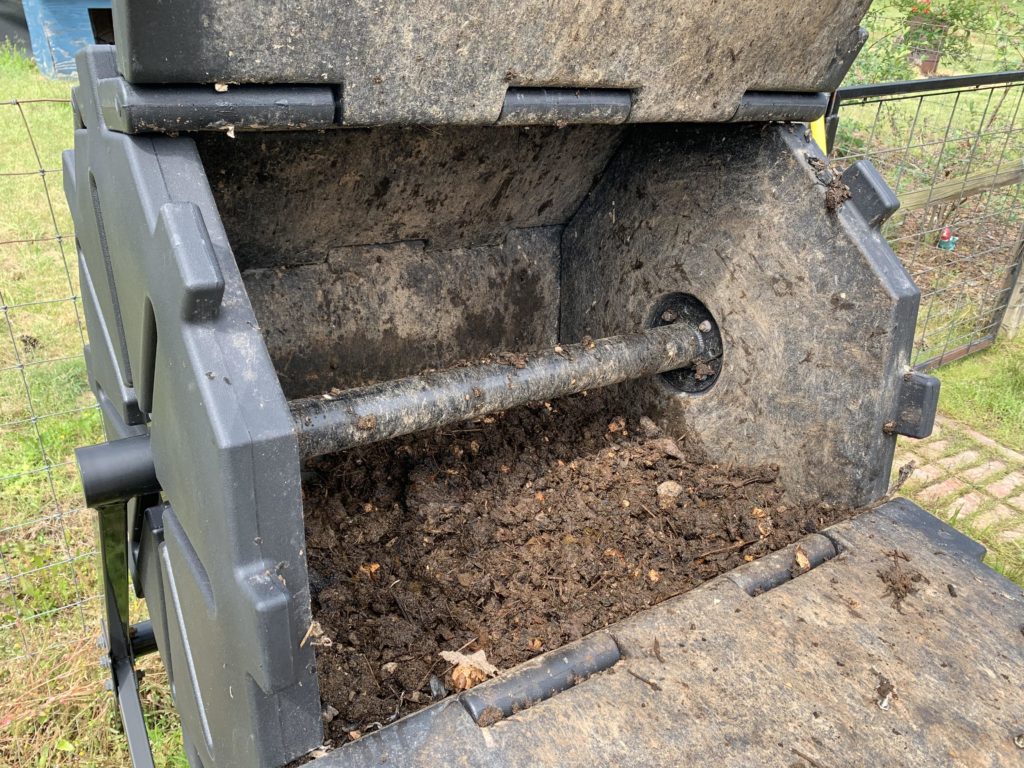
How Full Should It Be Before You Quit Adding To It?
This is another personal preference, but keep in mind that the pile has to have air to break down, so you need to be able to turn it. If it’s overflowing and you can’t turn it, then it’s probably too full. This also may depend on the size of your tumbler. Mine starts to get too heavy for me at half full.
How Much Compost Can You Expect From a Tumbler vs a Bin?
That really depends on the size of the tumbler. My bins give me more compost, but my tumblers produce compost more quickly for me. Compost is a very active and very rich addition to your garden, so you don’t need a lot. One to two inches to cover your garden is plenty. So it goes a long way.
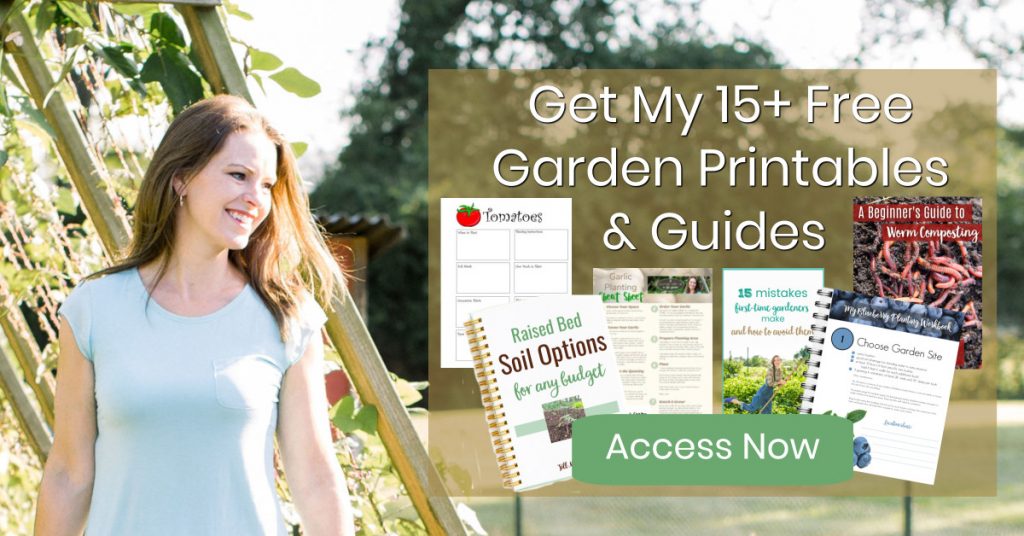
Troubleshooting Compost
Does it Smell?
Maybe. If you find that your compost pile smells, it means that you have too many greens in it. If you’re throwing all kitchen scraps in and there’s no carbon source to offset that, you’re going to have a stinky compost pile. This is especially true in a tumbler where it’s sealed.
An easy fix to this is to shred paper (from your kids’ school or your junk mail) and add this to the tumbler or pile. This is a simple and frugal way to get the browns added to your pile and get the smell under control.
What About Bugs?
I’ve not had any issues in my open-air bins (with the exception of fire ants, because they are everywhere in my area). In my tumblers, however, we’ve definitely had some bugs. This is probably because this is more nitrogen-rich, and more moisture is in the closed containers.
Are they gross looking? Absolutely. But, they are decomposing bugs and they are helping to break down your compost. Because their presence can be a sign that you’ve got too much nitrogen, try adding more browns to the pile and see if that helps.
How Do You Keep Weeds Out of an Open Bin Compost Pile?
First, don’t add weeds to the compost bin that have already flowered. The seeds will remain viable and will likely sprout.
What about weeds and grasses that invade the pile from the outside? This is a big struggle of mine as we have very invasive Bermuda grass here. I manually pull mine out of the bins. (I won’t add any kind of herbicide as it kind of defeats the purpose.)
Another thing to consider — if you add any kitchen scraps that have seeds, they will germinate if you’re a lazy composter like me, but I just break those up in the pile and let the sprouts decompose with the rest of the inputs.
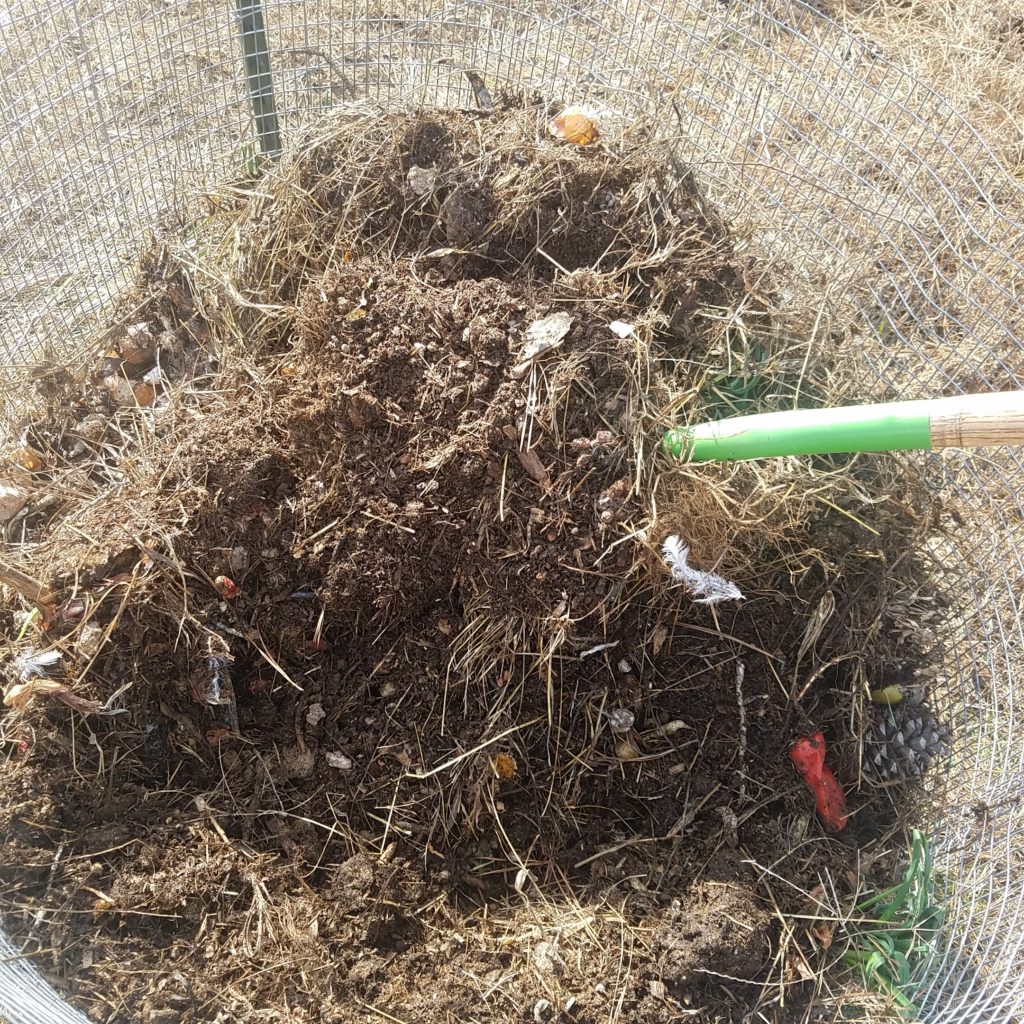
How Do You Keep Animals Out?
Depending on where you live, animals such as raccoons may visit your compost pile. (However, I live on 3 acres surrounded by woods and this has never been a problem for me.) But if you know you have scavenging animals nearby, a closed tumbler is ideal. If you have an open-air system, turn it frequently to prevent any animals from making a home inside. The only animal problem I’ve had are voles and I keep them away by turning the pile frequently. Also, make sure you cover your kitchen scraps to keep raccoons from snacking.
What Do You Do When The Compost Is Wet And Clumpy?
First of all, stop watering it. If it’s an open-air system, you can cover it to protect it from rain. Or, if you’re like me, you can simply leave it. I may add some more browns or cardboard, but more than likely it just needs to heat up and dry out.
What if the Compost Doesn’t Heat Up?
Yes, technically the perfect compost heats up in order for the materials to break down. Some people put extra focus and attention on making sure it gets to certain temperatures so that it kills all weed seeds and pathogens. I would love to do that, but like we’ve said a few times, it’s all organic matter and it will all break down.
Because I know that my compost pile will not get hot enough to kill certain things, I do not put any diseased plants in it. I don’t put anything that has had blight, powdery mildew, etc. And I’m careful not to add weeds that have gone to seed.
How Do You Know If You Did Something Wrong?
Usually, you can tell. It’s pretty easy to know if there are too many greens because it stinks. If it’s not breaking down, chances are there are too many browns in the pile and you need to add some nitrogen to the compost. Be observant, play around with it, but know that you can easily change things up as you go!
Why Doesn’t Compost Happen?
If you’re struggling to get compost to happen, there could be a few reasons why. As we’ve already mentioned, it could be too many greens, too many browns, not enough water or air, etc. The inputs may be so large the process takes longer. It could also be that you’ve expected it to happen much more quickly than it takes. Be patient. It takes time.
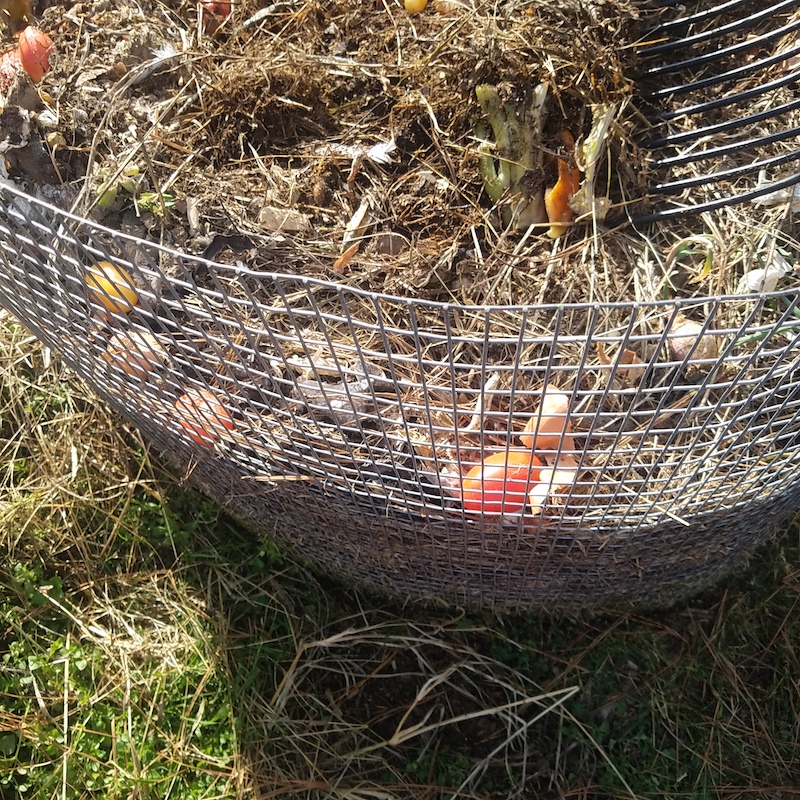
Easy and Frugal Composting
Can I do It Without Investing Any Money?
Absolutely. That’s the beauty of composting! You can start with free pallets or a plastic tote (drill holes for airflow). Some people dig a hole in the ground and start compost that way. I have a compost crock on my kitchen counter with a filter that I add scraps to. When it’s full, I add it to my compost pile and start over.
How Many Hours a Week Does It Take?
This is a really hard question to answer because, for me, it never takes hours per week. I know some people may spend time focused on their compost, but I’m just not that person (and I doubt many home gardeners are). I may spend minutes per week — the amount of time it may take me to walk my crock to the tumbler, dump it, spin it and walk back inside!
For my open-air piles, when I turn them, it’s a few minutes maybe. The biggest amount of time I spend is when it’s time to harvest and apply the compost, but I don’t mind this, of course!
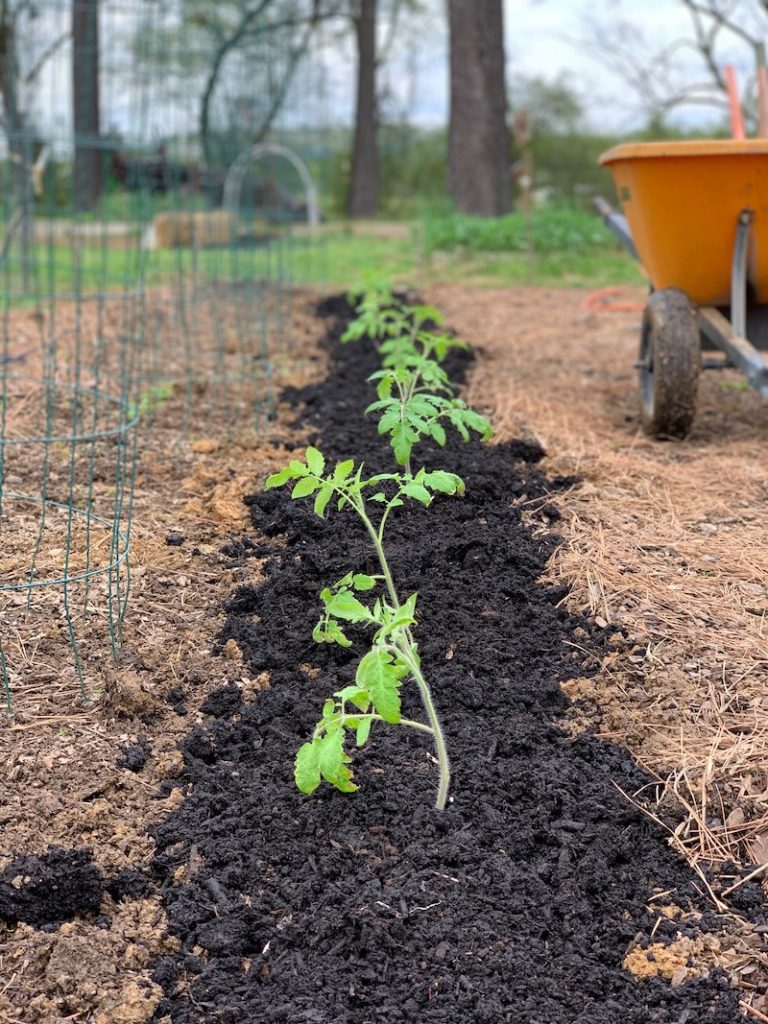
Can I Do it Discreetly In an HOA suburb?
Yes. You can find towers that are very discreet or tumblers that blend in with all sorts of outdoor furniture, etc. But, you can also bury your compost pile in the ground and no one would ever really know. You could even dig a trench in your garden and add it in there.
What Common Household Items Can You Add that Aren’t Kitchen Scraps?
The paper egg cartons are great. I would recommend cutting them up first. Paper towel rolls, toilet paper rolls, boxes (cut up), dryer lent, shredded paper, and newspaper are other options. These are all great sources of browns. Junk mail is great, just make sure it’s not coated and avoid the plastic.
Can You Add Citrus?
I’ve heard arguments from both sides regarding this question. I will tell you that in my garden, I add citrus to my compost pile regularly. That being said, if you make homemade lemonade on the regular, you might want to limit the amount you put in your compost pile, depending on the size of your pile.
Beyond The Compost Pile
Can You Add Kitchen Scraps Directly To the Soil?
I would say, yes, but carefully. I would make a trench of some sort and cover them. You must be careful as you can attract animals and rodents.
How Do You Use Compost In a Greenhouse?
I don’t have any personal experience with this, and even though I did just purchase a greenhouse, I can say I won’t be making compost in it my first year. I can definitely see the benefit of it; I’m just not seasoned in this topic.
What About Compost Tea?
Many gardeners swear by compost tea, yet a lot of scientific-minded people say it’s a complete waste of time. It’s not as easy as just steeping your compost. If you steep it too long without proper aeration with a bubbler, you can get an overgrowth of bad bacteria.
For me, I put compost on my garden and let it rain — that’s as far into compost “tea” that I ever go. I will let the earthworms break it down. Compost tea just isn’t worth the time and effort, but for others, they swear by it!
What About In Ground Compost Bins?
Play around with it. Test it. See what work for you. The beauty of composting is that it isn’t one size fits all. There are so many options and you’ve got lots of choice to see what works best for you and your budget in your area.
I hope that you have learned something today in regards to composting. It can be overwhelming, but it can also be as simple as taking that banana peel you had at lunch and throwing it in a bucket to start a compost pile. Don’t overthink it. Just start.
Which is best for you — a compost pile or a tumbler? In this post I share the pros and cons of each.
Do you get overwhelmed with garden planning?

Subscribe here for my best tips to plan your garden in just 7 days -- all for FREE.
Plus, I'll send you my "In the Garden E-mail" on Fridays, periodic updates on garden resources relevant to you, and you'll receive access to my entire bank of free garden downloads!
You are also agreeing to our privacy policy.

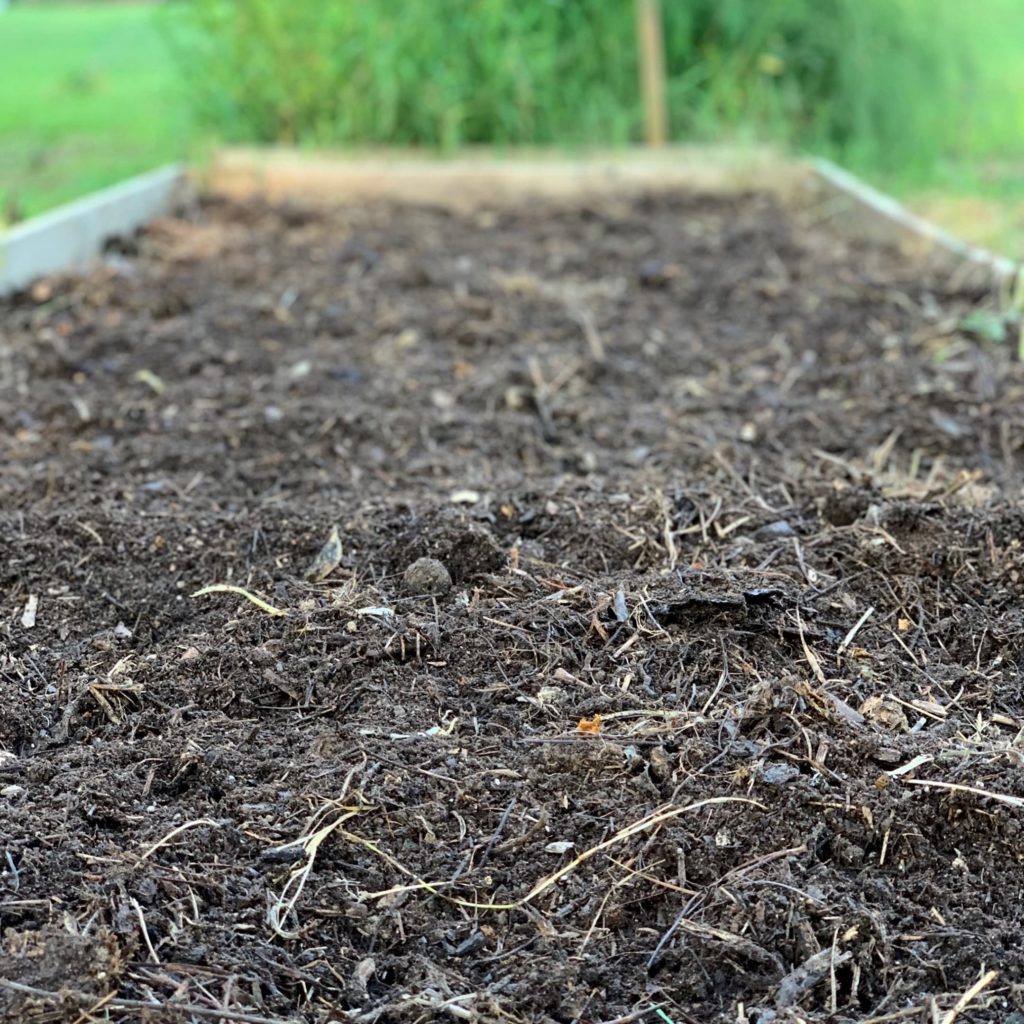
What ratio do you use in applying compost to gardens, flower beds, etc?
I don’t measure it. When I add compost, I usually add a light covering to the space. Perhaps two inches?
;Regarding breaking down input, the lawn mower is great. I just mowed the lawn and got green and brown together. Small twigs become smaller when the lawn mower passes over them.
I don’t rake leaves. Mow, dump bag, repeat two times. Keep in a pile for when I need brown.
You mentioned adding shredded paper to compost. Is it safe to add those with marker, crayons, ink?
I haven’t heard specifically about markers and crayons, but newspaper ink is soy-based, so I’m thinking maybe other ink is? But I’m not certain.
Ok, thank you!
For those new to composting, please do not mix animal products with plant refuse in your compost bin. If you do, it will smell like poo (rhyme intended). No meat scraps, bones, etc. Your neighbor thanks you.